Charles E W Bean, Diaries, AWM38 3DRL 606/255/1 - 1916 - 1937 - Part 15
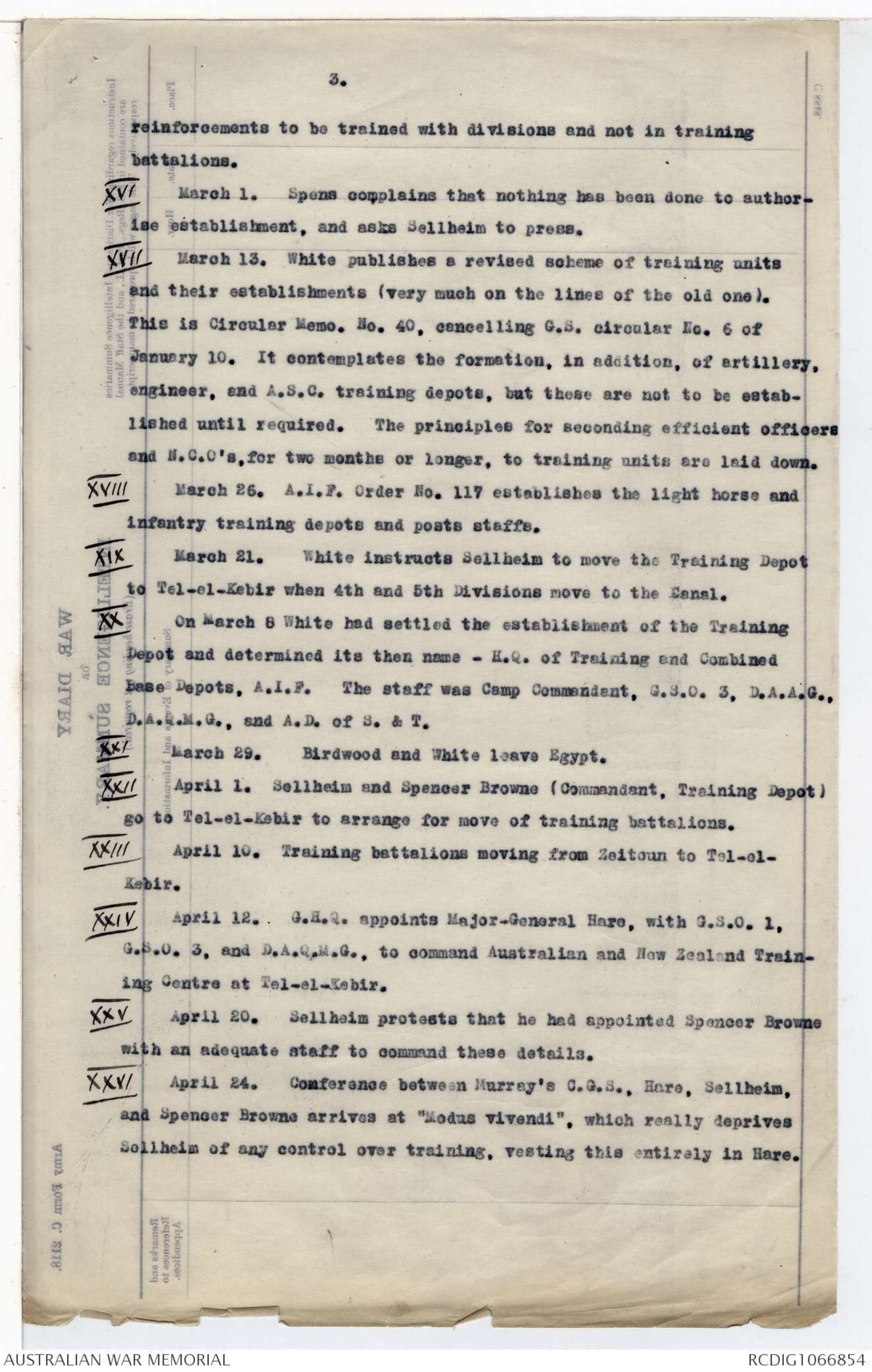
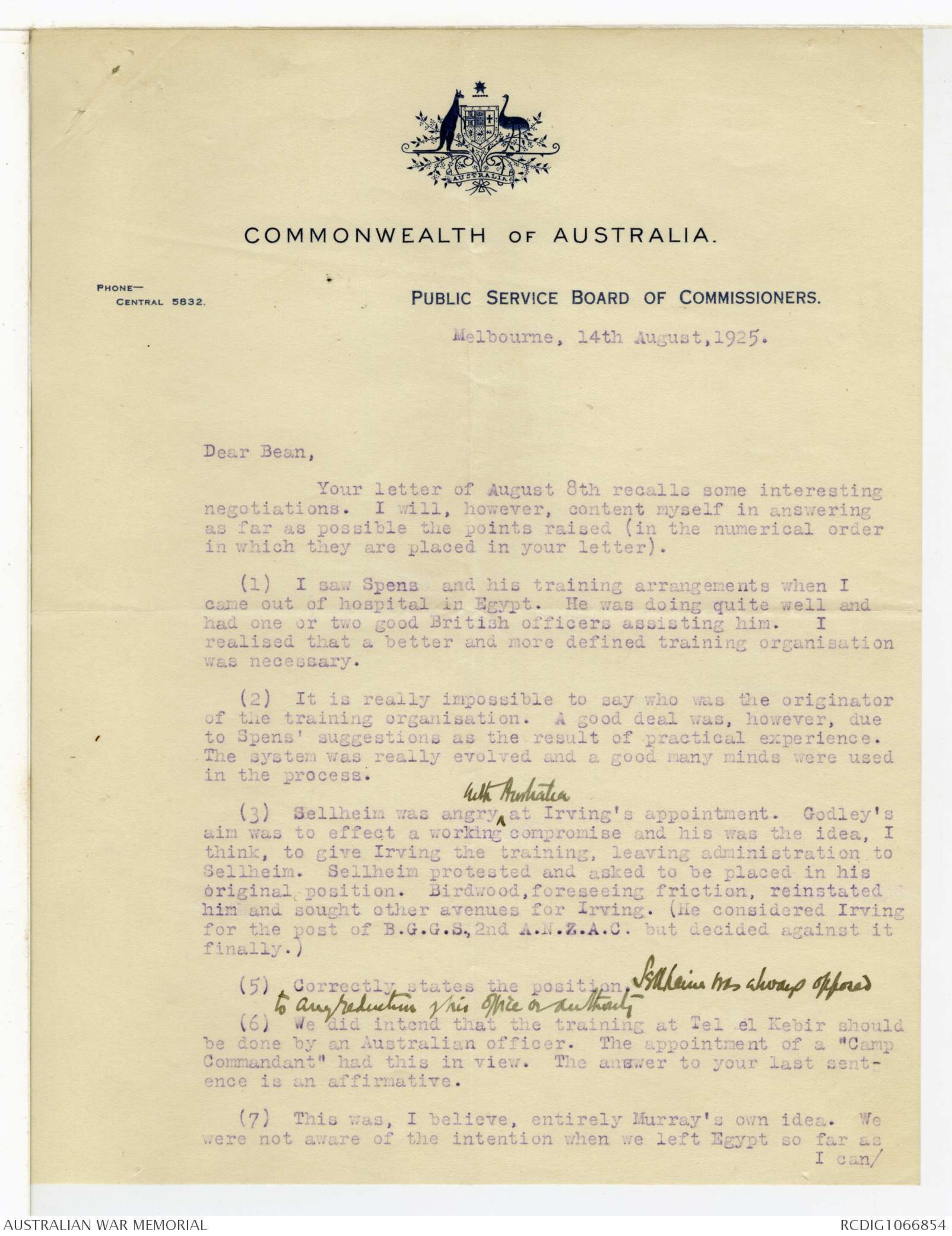
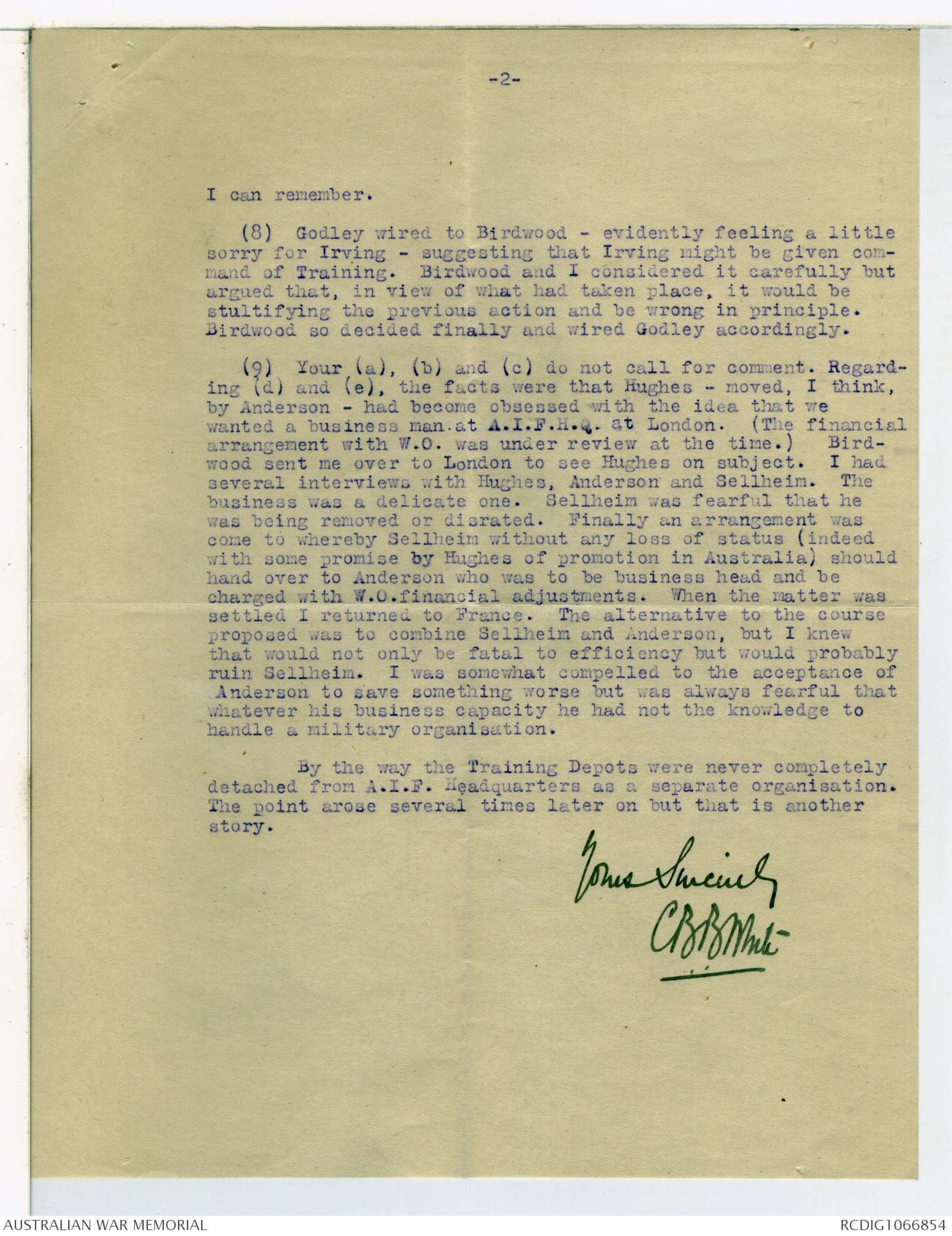
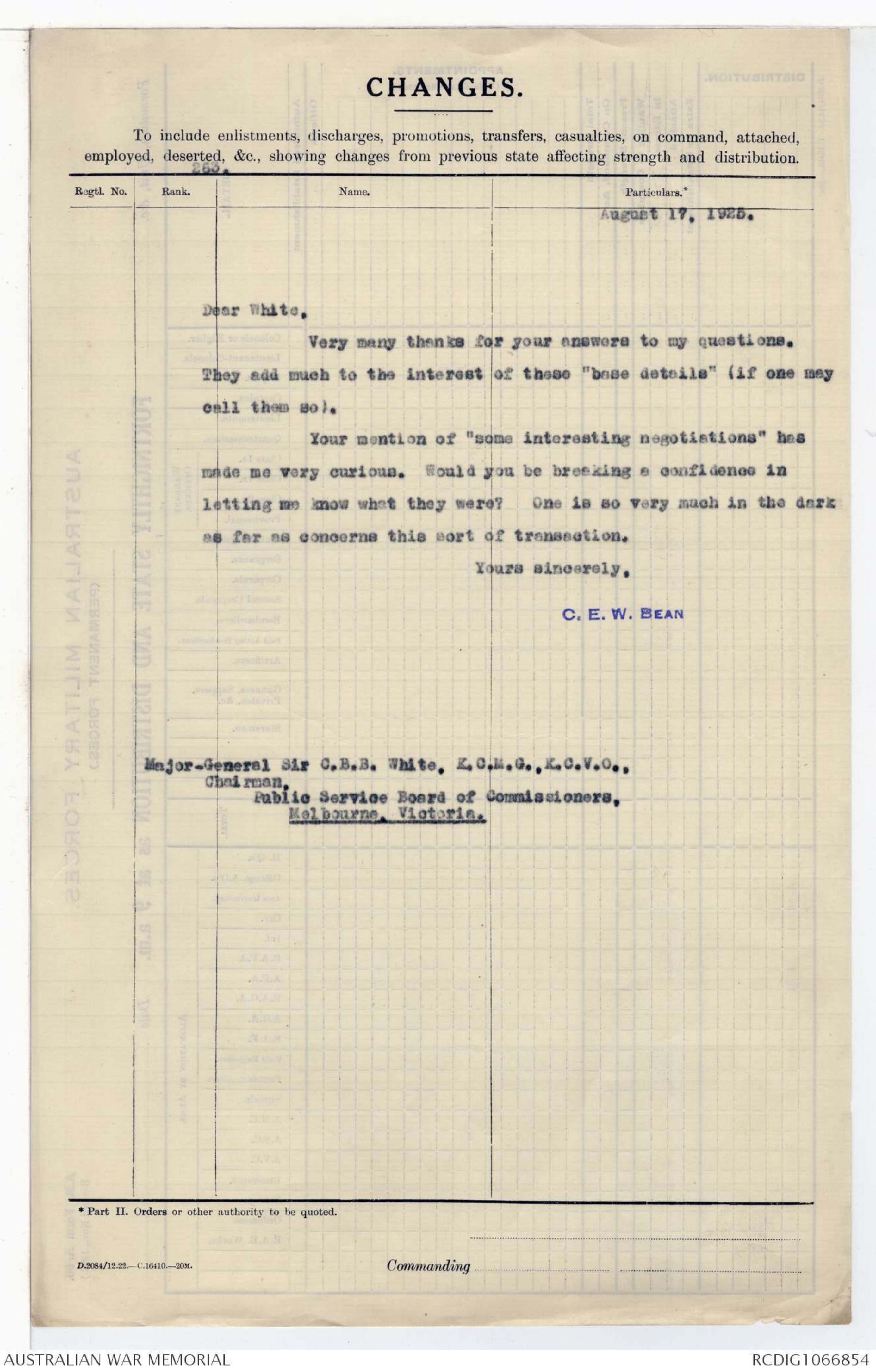
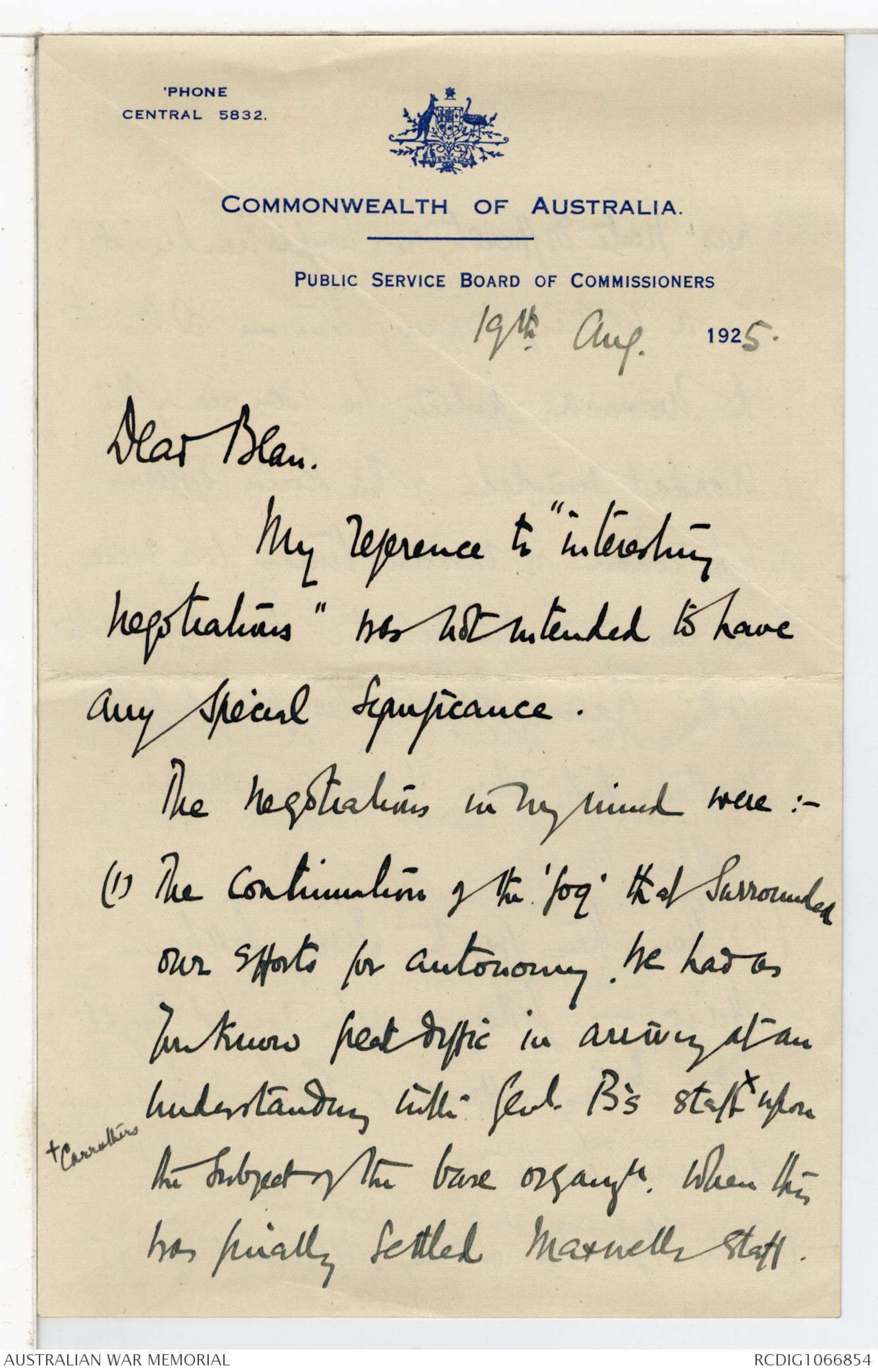
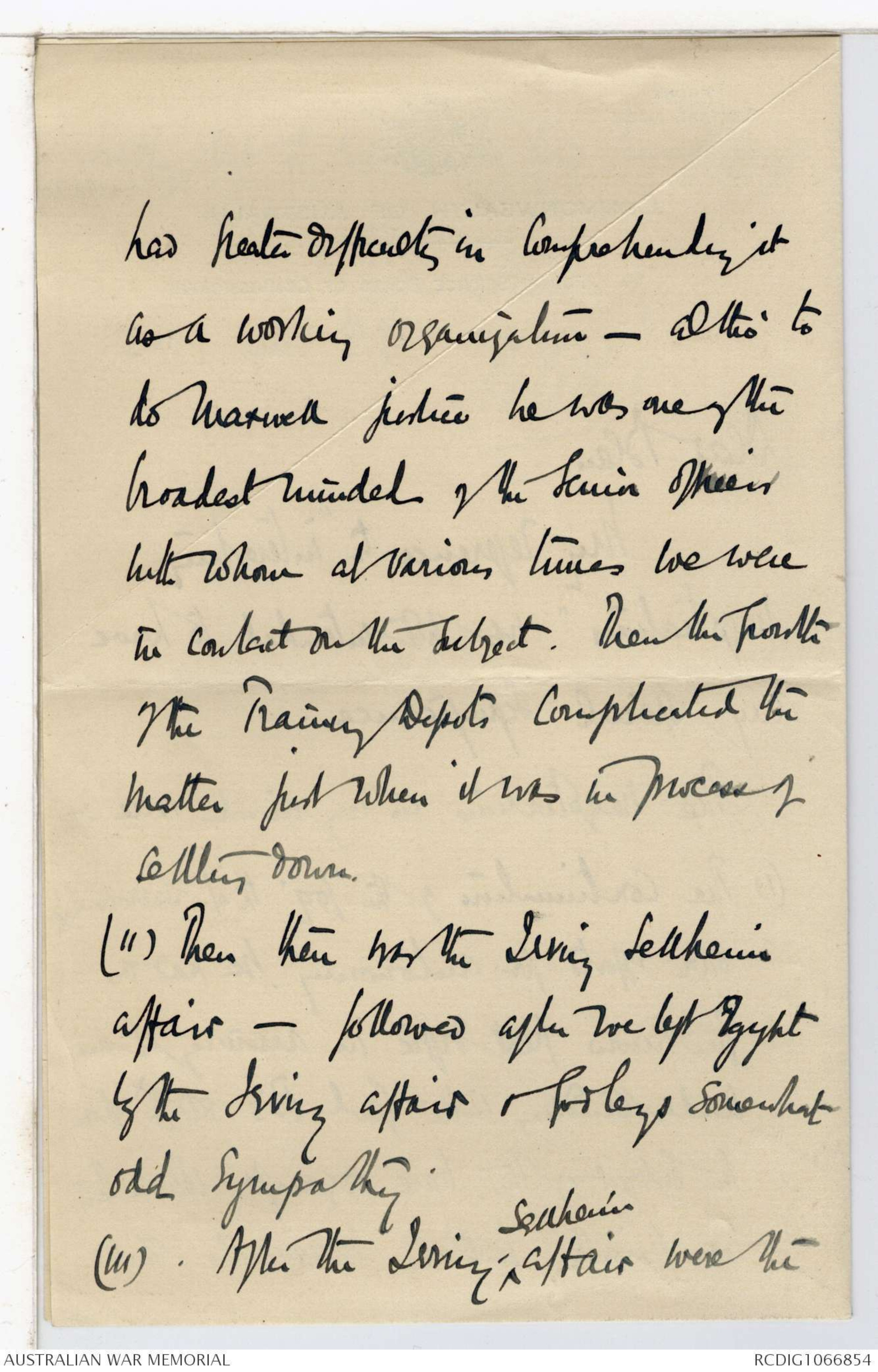
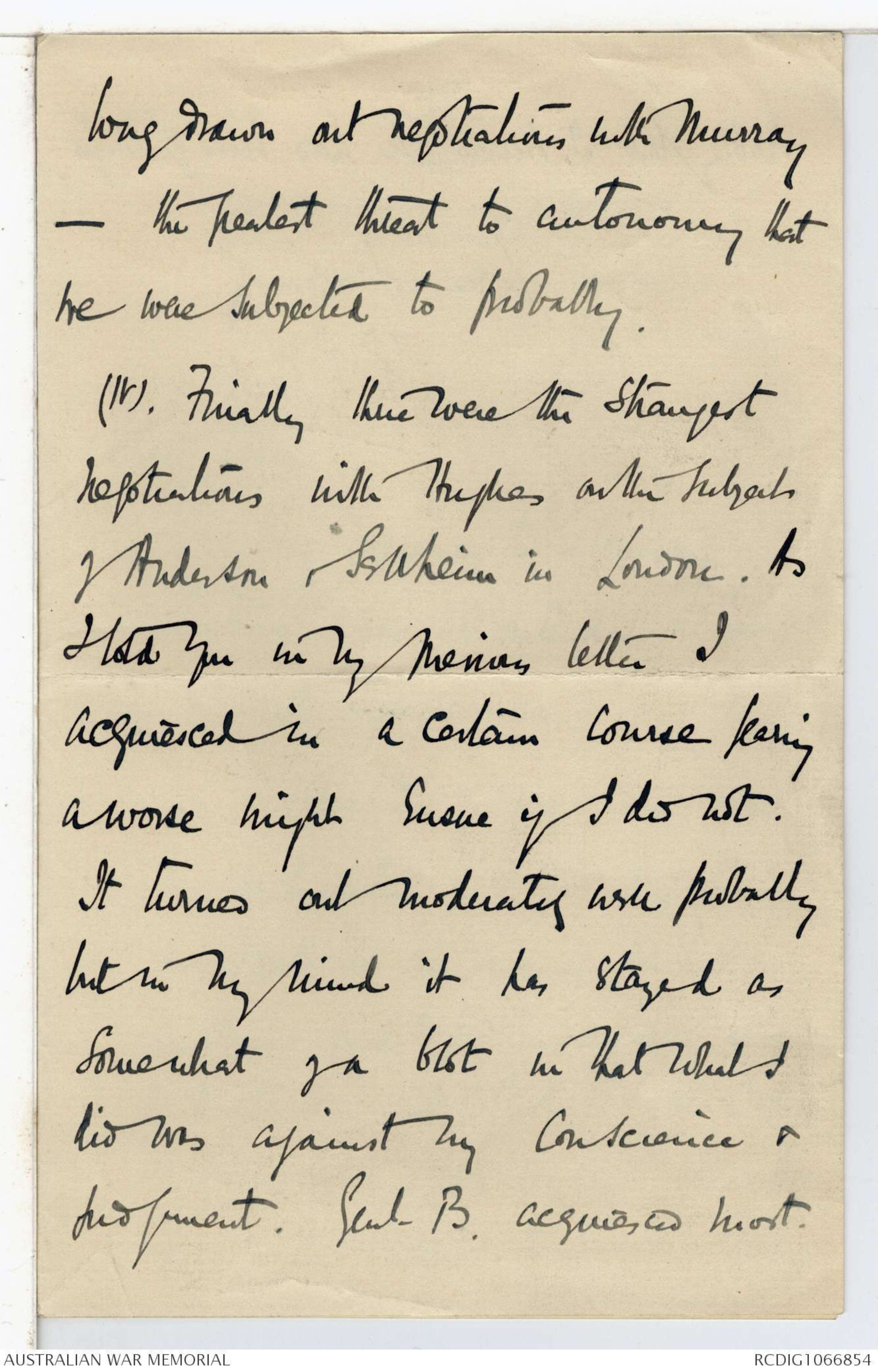
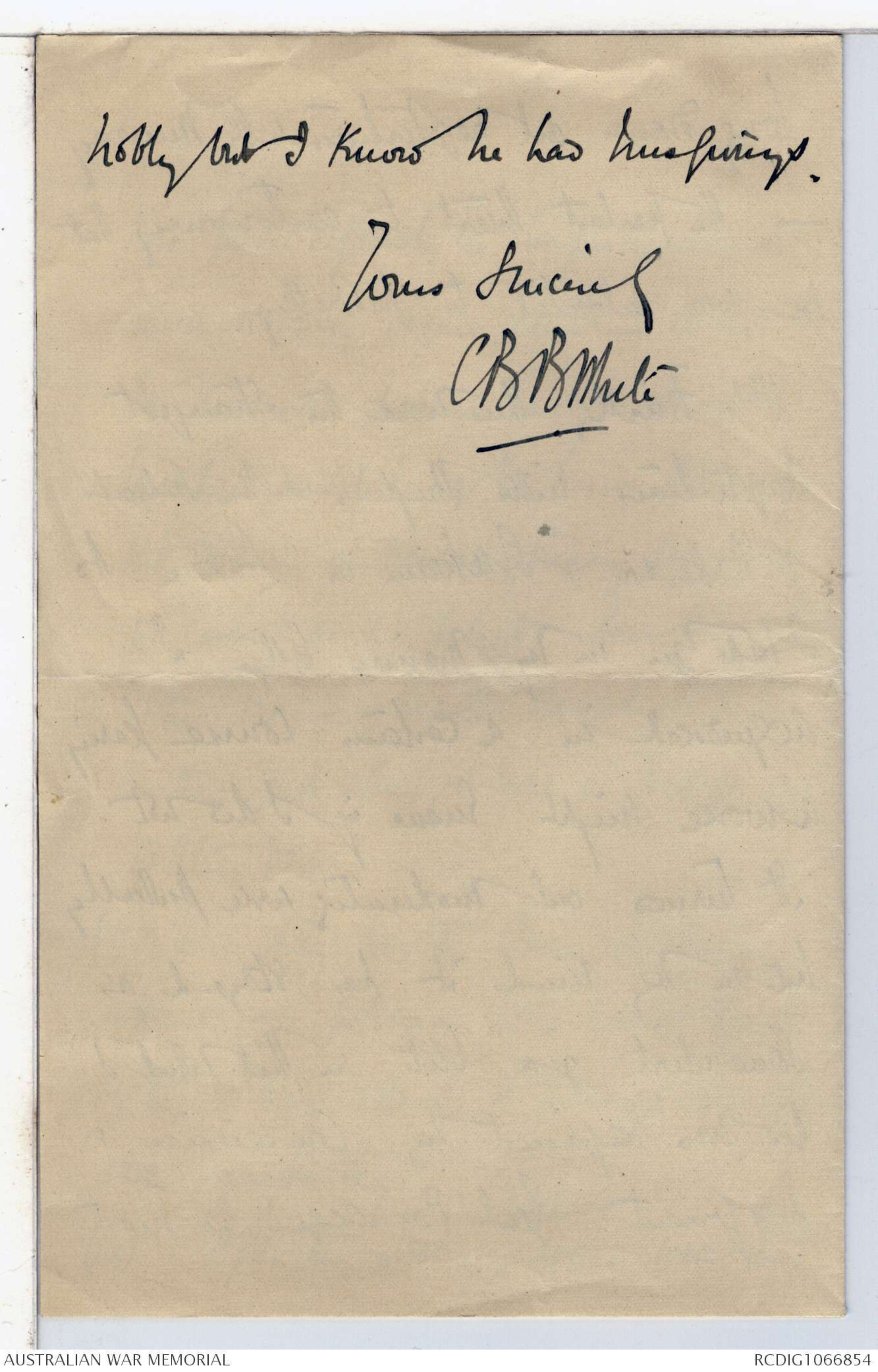
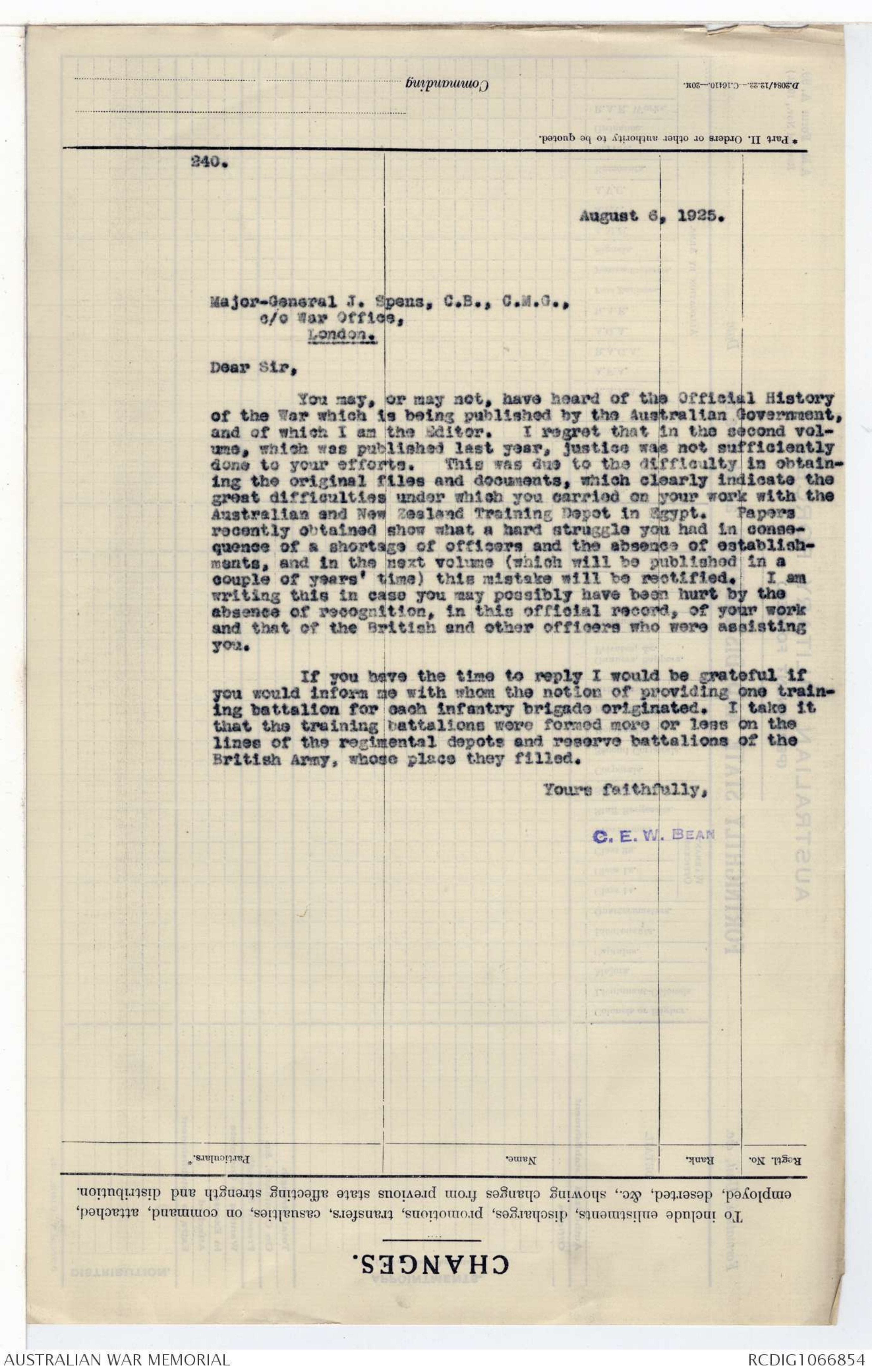
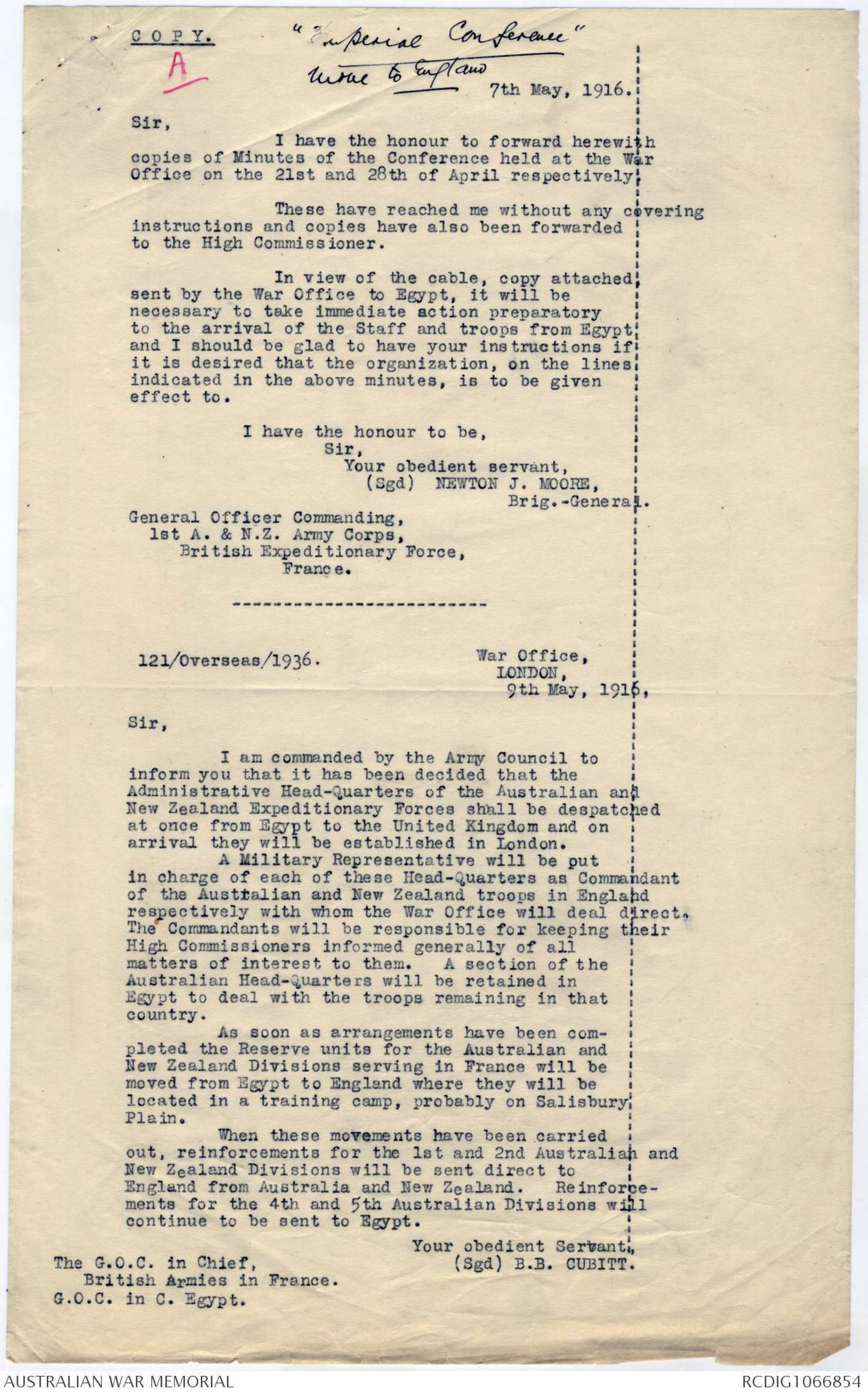
3.
reinforcements to be trained with divisions and not in training
battalions.
[* XVI *] March 1. Spens complains that nothing has been done to authorise
establishment and asks Sellheim to press.
[* XVII *] March 13. White publishes a revised scheme of training units
and their establishments (very much on the lines of the old one).
This is Circular Memo. No. 40, cancelling G.S. circular No. 6 of
January 10. It contemplates the formation, in addition, of artillery,
engineer, and A.S.C. training depots, but these are not to be established
until required. The principles for seconding efficient officers
and N.C.O's, for two months or longer, to training units are laid down.
[* XVIII*] March 26. A.I.F. Order No. 117 establishes the light horse and
infantry training depots and posts staffs.
[* XIX *] March 21. White instructs Sellheim to move the Training Depot
to Tel-el-Kebir when 4th and 5th Divisions move to the Canal.
[* XX *] On March 8 White had settled the establishment of the Training
Depot and determined its then name - H.Q. of Training and Combined
Base Depots, A.I.F. The staff was Camp Commandant, G.S.O. 3, D.A.A.G.,
D.A.Q.M.Q., and A.D. of S. & T.
[* XXI *] March 29. Birdwood and White leave Egypt.
[* XXII *] April 1. Sellheim and Spencer Browne (Commandant, Training Depot)
go to Tel-el-Kebir to arrange for move of training battalions.
[* XXIII *] April 10. Training battalions moving from Zeitoun to Tel-el-Kebir.
[* XXIV *] April 12. G.H.Q. appoints Major-General Hare, with G.S.O. 1,
G.S.O. 3, and D.A.Q.M.G., to command Australian and New Zealand Training
Centre at Tel-el-Kebir.
[* XXV *] April 20. Sellheim protests that he had appointed Spencer Browne
with an adequate staff to command these details.
[* XXVI *] April 24. Conference between Murray's C.G.S., Hare, Sellheim,
and Spencer Browne arrives at "Modus vivendi", which really deprives
Sellheim of any control over training, vesting this entirely in Hare.
COMMONWEALTH OF AUSTRALIA.
PHONE -
CENTRAL 5832
PUBLIC SERVICE BOARD OF COMMISSIONERS.
Melbourne, 14th August, 1925.
Dear Bean,
Your letter of August 8th recalls some interesting
negotiations. I will, however, content myself in answering
as far as possible the points raised (in the numerical order
in which they are placed in your letter).
(1) I saw Spens and his training arrangements when I
came out of hospital in Egypt. He was doing quite well and
had one or two good British officers assisting him. I
realised that a better and more defined training organisation
was necessary.
(2) It is really impossible to say who was the originator
of the training organisation. A good deal was, however, due
to Spens' suggestions as the result of practical experience.
The system was really evolved and a good many minds were used
in the process.
(3) Sellheim was angry ^with Australia at Irving's appointment. Godley's
aim was to effect a working compromise and his was the idea, I
think, to give Irving the training, leaving administration to
Sellheim. Sellheim protested and asked to be placed in his
original position. Birdwood, foreseeing friction, reinstated
him and sought other avenues for Irving. (He considered Irving
for the post of B.G.G.S., 2nd A.N.Z.A.C. but decided against it
finally.)
(5) Correctly states the position. Sellheim was always opposed
to any reduction of his office or authority.
(6) We did intend that the training at Tel el Kebir should
be done by an Australian officer. The appointment of a "Camp
Commandant" had this in view. The answer to your last sentence
is an affirmative.
(7) This was, I believe, entirely Murray's own idea. We
were not aware of the intention when we left Egypt so far as
I can/
-2-
I can remember.
(8) Godley wired to Birdwood - evidently feeling a little
sorry for Irving - suggesting that Irving might be given command
of Training. Birdwood and I considered it carefully but
argued that, in view of what had taken place, it would be
stultifying the previous action and be wrong in principle.
Birdwood so decided finally and wired Godley accordingly.
(9) Your (a), (b) and (c) do not call for comment. Regarding
(d) and (e), the facts were that Hughes - moved, I think,
by Anderson - had become obsessed with the idea that we
wanted a business man at A.I.F.H.Q. at London. (The financial
arrangement with W.O. was under review at the time.) Birdwood
sent me over to London to see Hughes on subject. I had
several interviews with Hughes, Anderson and Sellheim. The
business was a delicate one. Sellheim was fearful that he
was being removed or disrated. Finally an arrangement was
come to whereby Sellheim without any loss of status (indeed
with some promise by Hughes of promotion in Australia) should
hand over to Anderson who was to be business head and be
charged with W.O. financial adjustments. When the matter was
settled I returned to France. The alternative to the course
proposed was to combine Sellheim and Anderson, but I knew
that would not only be fatal to efficiency but would probably
ruin Sellheim. I was somewhat compelled to the acceptance of
Anderson to save something worse but was always fearful that
whatever his business capacity he had not the knowledge to
handle a military organisation.
By the way the Training Depots were never completely
detached from A.I.F. Headquarters as a separate organisation.
The point arose several times later on but that is another
story.
Yours Sincerely
C B B White
August 17, 1925.
Dear White,
Very many thanks for your answers to my questions.
They add much to the interest these "base details" (if one may
call them so).
Your mention of "some interesting negotiations" has
made me very curious. Would you be breaking a confidence in
letting so know what they were? One is so very much in the dark
so far as concerns this sort of transaction.
Yours sincerely,
C. E. W. BEAN
Major-General Sir C. B. B. White, K.C.M.G., K.C.V.O.,
Chairman
Public Service Board of Commissioners,
Melbourne. Victoria
'PHONE
CENTRAL 5832.
COMMONWEALTH OF AUSTRALIA.
PUBLIC SERVICE BOARD OF COMMISSIONERS
19th Aug. 1925.
Dear Bean.
My reference to "interesting
negotiations" was not intended to have
any special significance.
The negotiations in my mind were :-
(1) The continuation of the 'fog' that surrounded
our efforts for autonomy. We had as
you know great diffic in arriving at an
understanding with Genl B's staff x upon
[*xCurruthers*]
the subject of the base organiztn. When this
has finally settled Maxwells Staff.
had greater difficulty in comprehending it
as a working organization - altho' to
do Maxwell justice he was one of the
broadest minded of the Senior officer
with whom at various times we were
to contact on the subject. Then the thought
of the Training Depots complicated the
matter just when it was in process of
settling down.
(II) Then there was the Irving Sellheim
affair — followed after we left Egypt
by the Irving affair & Godleys somewhat
odd sympathy
(III). After the Irving - ^Sellheim affair were the
long drawn out negotiations with Murray
- the greatest threat to autonomy that
we were subject to probably.
(IV). Finally there were the strangest
negotiation with Hughes on the subjects
of Anderson & Sellheim in London. As
I told you in my previous letter I
acquiesced in a certain course fearing
a worse might ensue if I did not.
It turned out moderately worse probably
but in my mind it has stayed as
somewhat of a blot in that what I
did was against my conscience &
judgement. Genl B. acquiesced most.
nobly but I know he had misgivings.
Yours Sincerely
C B B White
240.
August 6, 1925
Major-General J. Spens, C.B., C.M.G.,
c/o War Office,
London.
Dear Sir,
You may, or may not, have heard of the Official History
of the War which is being published by the Australian Government,
and of which I am the Editor. I regret that in the second volume,
which was published last year, justice was not sufficiently
done to your efforts. This was due to the difficulty in obtaining
the original files and documents, which clearly indicate the
great difficulties under which you carried on your work with the
Australian and New Zealand Training Depot in Egypt. Papers
recently obtained show what a hard struggle you had in consequence
of a shortage of officers and the absence of establishments,
and in the next volume (which will be published in a
couple of years' time) this mistake will be rectified. I am
writing this in case you may possibly have been hurt by the
absence of recognition, in this official record, of your work
and that of the British and other officers who were assisting
you.
If you have the time to reply I would be grateful if
you would inform me with whom the notion of providing one training
battalion for each infantry brigade originated. I take it
that the training battalions were formed more or less on the
lines of the regimental depots and reserve battalions of the
British Army, whose place they filled.
Yours faithfully,
C. E. W. BEAN
C O P Y.
[*A
"Imperial Conference"
Move to England*]
7th May, 1916.
Sir,
I have the honour to forward herewith
copies of Minutes of the Conference held at the War
Office on the 21st and 28th of April respectively.
These have reached me without any covering
instructions and copies have also been forwarded
to the High Commissioner.
In view of the cable, copy attached,
sent by the War Office to Egypt, it will be
necessary to take immediate action preparatory
to the arrival of the Staff and troops from Egypt
and I should be glad to have your instructions if
it is desired that the organization, on the lines
indicated in the above minutes, is to be given
effect to.
I have the honour to be,
Sir,
Your obedient servant,
(Sgd) NEWTON J. MOORE,
Brig.-General.
General Officer Commanding,
1st A. & N.Z. Army Corps,
British Expeditionary Force,
France.
121/Overseas/1936.
War Office,
LONDON,
9th May, 1916,
Sir,
I am commanded by the Army Council to
inform you that it has been decided that the
Administrative Head-Quarters of the Australian and
New Zealand Expeditionary Forces shall be despatched
at once from Egypt to the United Kingdom and on
arrival they will be established in London.
A Military Representative will be put
in charge of each of these Head-Quarters as Commandant
of the Australian and New Zealand troops in England
respectively with whom the War Office will deal direct.
The Commandants will be responsible for keeping their
High Commissioners informed generally of all
matters of interest to them. A section of the
Australian Head-Quarters will be retained in
Egypt to deal with the troops remaining in that
country.
As soon as arrangements have been completed
the Reserve units for the Australian and
New Zealand Divisions serving in France will be
moved from Egypt to England where they will be
located in a training camp, probably on Salisbury
Plain.
When these movements have been carried
out, reinforcements for the 1st and 2nd Australian and
New Zealand Divisions will be sent direct to
England from Australia and New Zealand. Reinforcements
for the 4th and 5th Australian Divisions will
continue to be sent to Egypt.
Your obedient Servant:
(Sgd) B. B. CUBITT.
The G.O.C. in Chief
British Armies in France.
G.O.C. in C. Egypt.
 Deb Parkinson
Deb ParkinsonThis transcription item is now locked to you for editing. To release the lock either Save your changes or Cancel.
This lock will be automatically released after 60 minutes of inactivity.